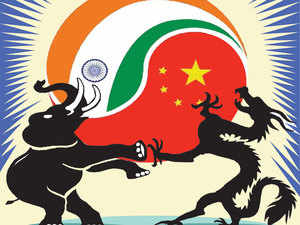Ban on Chinese goods will fail, work harder if you want to catch up: China's media advises India
India will have to turn its culture around with things like 996 if it hopes to compete with China, Global Times says.

state-run media just took up billionaire Jack Ma's controversial "996" call and repurposed it for a very different use: to give India a lesson in work culture.
An inefficient manufacturing sector will make sure India has no chance of catching up with China, Global Times said in a recent article. That is also the reason why India's efforts to ban Chinese goods will fall face flat, it argued.
Alibaba's billionaire founder Jack Ma recently made headlines after endorsing a tough overtime work schedule that has since been widely debated everywhere. He essentially meant a work culture of long hours, referred to as 996 — 9 am to 9 pm, six days a week.
According to Global Times, India must seriously look at 996 if it hopes to raise its manufacturing competitiveness. "Adopting 996 can help India improve its business environment, attract foreign investment and eventually enhance India's competitiveness in the manufacturing sector," it said.
The article comes at a time when India's manufacturing sector finds itself languishing in a multi-year trough.
India's manufacturing mess
Official data released by the CSO late last week showed that for the full year to March, India's manufacturing growth fell to a three-year low of 3.6%, down from 4.4% in the comparable period last year.
An inefficient manufacturing sector will make sure India has no chance of catching up with China, Global Times said in a recent article. That is also the reason why India's efforts to ban Chinese goods will fall face flat, it argued.
Alibaba's billionaire founder Jack Ma recently made headlines after endorsing a tough overtime work schedule that has since been widely debated everywhere. He essentially meant a work culture of long hours, referred to as 996 — 9 am to 9 pm, six days a week.
According to Global Times, India must seriously look at 996 if it hopes to raise its manufacturing competitiveness. "Adopting 996 can help India improve its business environment, attract foreign investment and eventually enhance India's competitiveness in the manufacturing sector," it said.
The article comes at a time when India's manufacturing sector finds itself languishing in a multi-year trough.
India's manufacturing mess
Official data released by the CSO late last week showed that for the full year to March, India's manufacturing growth fell to a three-year low of 3.6%, down from 4.4% in the comparable period last year.
Primarily because of the state of affairs in manufacturing, capital goods and consumer durables, IIP figures hit a 21-month low in March. Manufacturing — which makes up 77.63% of the IIP basket — contracted 0.4% during the month under consideration.
On a quarterly basis, this was one of the lowest average growth figures at 0.46% since the government revised the base year of the index to 2011-12 from 2004-05, said an ET article.
The core sector data, which went against the tide to hit a five-month high, was the only saving grace for India in an otherwise turbulent month that also saw other important indicators like cap goods — the proxy for investment activity — and consumer durables — the determinant of urban demand — fall sharply.
Bringing Modi into the argument
China has no reason to worry about any Indian ban on its goods, said the newspaper, basing its argument on the premise that "India's manufacturing sector is highly uncompetitive against China's, which is able to offer daily necessities with a high performance-price ratio."
The article then brings PM Modi into its argument: "As some Indian people are choosing to boycott Chinese products, Prime Minister Narendra Modi said the matter is for the public to decide." "As far as public sentiment toward Chinese goods is concerned, we should leave it to their sooj-boojh (wisdom)," it quotes Modi as telling Network18.
"Some people think Modi has tacitly given consent to the boycott of Chinese products in India, but we don't think so. Why can Modi trust the public's wisdom? Because the boycott is doomed to fail and Indian people will eventually embrace a return to reason."
The media outlet said the wisdom of the Indian consumer will prevail in the end: "The ghost of nationalism may prompt some Indian people to boycott Chinese products in the short term, but they will finally choose products with a high performance-price ratio in the long term, no matter where those products are made."
The China sermon for India
The article outlines China's rise to the top of the global manufacturing ladder, explaining how the country earned its manufacturing chops over the last few decades. "This achievement can be partly attributed to the hard-working spirit of Chinese employees in labour-intensive industries, as well as research and development personnel and entrepreneurs," it says.
According to Global Times, the 996 schedule is a common phenomenon in China — many Chinese workers have embraced it, and many billionaires work even longer hours.
In India though, according to the article, "foreign investors often complain about the relatively short working hours and high levels of social welfare enjoyed by local workers."
India will have to turn this work culture around with things like 996 if it has to have any hope of producing goods that can rival Chinese products, said the article.
Global Times concludes by saying: "A tough challenge lies ahead of India. Without the 996 schedule and the spirit of hard work, India can hardly catch up with China."
Comments
Post a Comment